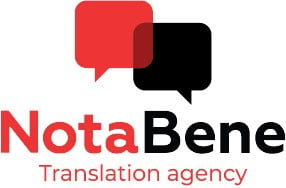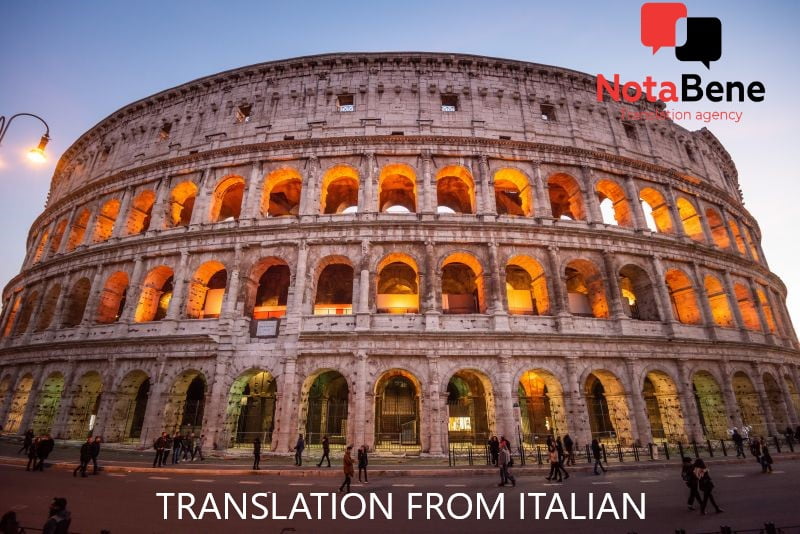Order translation from Italian or into Italian at NotaBene Agency in Poland!
NotaBene Translation Agency is an experienced supplier of translation from Italian into Polish and vice versa for any documents or texts.
What types of texts does NotaBene Translation Agency work with?
– Technical translation from Italian — we translate any texts in electronics, aviation and shipbuilding, agriculture, industry, oil and chemistry, etc. For this purpose, we pick translators who understand the specific nature of a given industry.
– IT translation from Italian for the localization of applications, games, software and websites.
– Medical translation from Italian — books, manuals, articles in specialized printed and online publications, clinical records, correspondence with medical institutions, transcriptions and translations of test results, instructions for medicines and many other types of texts. This kind of translation requires flawless knowledge of medical terminology and focus on detail to rule out ambiguity, because the result can affect the health or life of many people.
– Legal translations from Italian: statutes, registration deeds, articles of incorporation, contracts, powers of attorney, court records and many other similar documents.
– Financial translation: this type of translation includes the translation of balance sheets, tax returns, payment invoices, waybills, tender documents, etc.
– Literary or fiction translation from Italian of fiction, marketing and advertising materials. Unlike the previous types of translation, in this case there is more room for a translator’s creativity, because there is no need for “word for word” translation. The most important thing is that the translated material produces the same impact as the original, while an excellent translation may even make it better.
Please note that the translation mentioned is certified by an agency seal only. If you need sworn translation, kindly notify your manager in advance. Sworn translation is possible only for certain languages.
How to have a translation from Italian into English, Polish, Russian, Belarusian or Ukrainian?
First of all, you need to order it. To do so, send your source text and specify your requirements for the translation from Italian. A customer service specialist at the Nota Bene Translation Agency will prepare a ToR based on the specific features of the order. If the project involves more than one job, a unique glossary is created to ensure the consistency and proper use of terminology.
An entire team of several professionals normally works on a job: a translator, proofreader, editor, quality controller, layout designer and manager who will be available during working hours. In order to rule out human errors, the translation agency uses modern services to check punctuation, idioms, numerical expressions, and formulas. The material is also reviewed by the chief editor.
Confidentiality of translated data is ensured by a special NDA, whenever a customer wishes to have one. Documents can be delivered to any country.
We very rarely apply additional fees for “urgency” or “specialized subjects”, so you can be sure that the price will not rise when the project is delivered. It is true that in rare cases, such as “we need to have it yesterday” instances, and when a customer is willing to pay a higher rate for the team to work outside normal working hours, at night or on weekends, the fee might be increased, but this is always negotiated with the customer in advance.
Amazing facts about the Italian language
1. Italian belongs to the Romance group of Indo-European languages. It has evolved from colloquial Latin and was originally used only by the common people. The first literary work written and published in Italian was Dante Alighieri’s The Divine Comedy. Incidentally, literary Italian has undergone virtually no change in either sound or form over the last seven centuries.
2. Until the beginning of the twentieth century, the teaching at higher educational institutions in Italy was exclusively in Latin. Only that year the Royal Government of Italy in 1912 officially legalized the transition of higher education to the Italian language.
3. All Italian words, with the exception of some articles and prepositions, end in a vowel. Moreover, Northern Italians traditionally end their surnames with an “i” and Southern Italians with an “o”. The most common Italian surname is Russo.
4. the Italian language has given the world almost every modern musical term (concerto, maestro, aria, sonata, piano, soprano) and many culinary terms (mozzarella, amaretto, pasta, pizza, cappuccino).
5. The letters J, K, W, X and Y did not originally exist in Italian. And therefore all the words in which they occur today are borrowed – whisky, taxi, jeans.
6. Italy was for many centuries fragmented into small principalities and city-states. That is why most Italians speak territorial dialects which have little in common with their state language. Moreover, 14% of Italians do not understand any language other than their dialect. Not even the Italian.
7. The longest word in the Italian language is precipitevolissimevolmente “very fast”. It consists of 26 letters.
8. There is no word for ‘hangover’ in Italian. It is translated by a long descriptive sentence – dopo aver bevuto troppo (after drinking too much).
9. The Italian language has 15 tenses. It is noteworthy that the tenses passato prossimo (nearest past tense) and passato remoto (long past tense) are used correctly only by people from Tuscany. In other regions the past tense is only used in business documents, and the nearest past is used arbitrarily.
10. Pronunciation of an Italian easily tells from which region of the country the person comes. For instance, the Tuscan pronounces the “s” sound as “h”. That is to say, Coca-Cola from their mouths sounds something like “Hoha-Hola”.
11. Endings in Italian play a special role as they can drastically change the meaning of a word. For example, ‘bella donna’ is translated from Italian as ‘beautiful’. The word bellissima means “wonderfully beautiful”, bellina means “pretty”, bellona means “faded, but still beautiful”, and belloccia means “nice in every way”.
P.S. By the way, the name of the country “Italy”, oddly enough, has Greek roots and means “country of calves”.
We have been in business for over 20 years and during that time we have learned to work well. Trust us with your translation from Italian and get a great result at a reasonable price!








